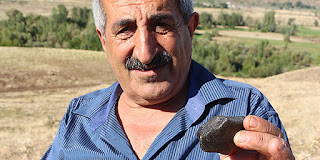Syrian refugees join meteorite search in eastern Turkey
MENAFN - The Journal Of Turkish Weekly
November 23, 2015
(MENAFN - The Journal Of Turkish Weekly) Syrian refugees in Turkey have been joining the search for meteorite fragments in the eastern province of Bingol.
In Saricicek a village 5 km (3 miles) east of the provincial capital Bingol showers of extra-terrestrial rocks have fallen on their land since early September.
After hearing rumors that researchers and academics were keen to collect the small meteorites villagers have been gathering them day and night since then.
The area still draws hundreds of locals and foreigners after reports that the meteorites whether for research or collectors cost between 20 and 60 per gram.
Around 40 families of Syrians living in Diyarbakir Sanliurfa and Kilis provinces arrived in the area nearly a week ago in hopes of finding meteorites that have fallen from the skies.
Several Syrians most living in makeshift tents entertain the dream of making money from the stones which they described as a "gift from God".
Abbas Mosa Hemo from the Syrian Raqqa province told Anadolu Agency on Sunday that he came with his family to search for the meteorites.
"We have come to seek the stone God has sent as a gift" said Hemo adding they had been able to find two meteorites despite all their efforts.
Another Syrian Shaban Hemo who fled the Syrian city of Aleppo and now lives in a two-room home in the southeastern province of Diyarbakir said he had not found a single meteorite despite a three-day search.
"It is said 'this stone [meteorite] is very precious worth money go and search them'. If I find any I will build a house with that money when we return to Syria" Shaban Hemo said.
Muslum Sefer another refugee from the Syrian town of Kobani that was thescene of fierce clashes between Daesh and Kurdish fighters said he came to Bingol four days ago to find a meteorite.
"I came here with three four friends of mine. One friend and I found one meteorite each; they offered 300 for them but we declined as we learnt that higher prices are offered in Istanbul" Sefer said.
Sefer said he planned to buy a home with the income from the stones they found.
Ali Halil Hemo said his house in Syria had been decimated in clashes and he also wanted to build a new one if he made money with the meteorites.
"We as family came to the village after learning that a precious stone fell in Bingol; it is holy and precious as it came from the sky and everyone is striving to find this stone" Halil Hemo added.
Ozan Unsalan an associate professor at Istanbul University's science faculty has created a website to gather information about the meteorites.
On Nov. 16 he told the shards found around Saricicek were part of 4Vesta one of the largest asteroids in the solar system and were considered precious among the scientific community.
Last week Finance Minister Mehmet Simsek took to Twitter to ask Turkish users whether they thought the meteorites sold in Saricicek were taxable. More than 28000 twitter users replied to the minister's questions. The majority said the income should not be taxed.
By Servet Gunerigok
Source: menafn.com
 Mrs Bualom’s husband, Kittisak, 75, said he heard a sound of explosion in the sky at about 7am before the 300g rock fell through his roof.
Mrs Bualom’s husband, Kittisak, 75, said he heard a sound of explosion in the sky at about 7am before the 300g rock fell through his roof. 



